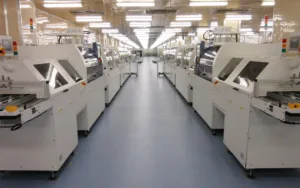Japan Display Inc. (JDI) developed a breakthrough OLED technology known as eLEAP (environment positive, Lithography with maskless deposition, Extreme long life, low power, and high luminance, and Any shape Patterning). The company claimed it offered significant advancements over conventional OLED displays by utilizing a lithographic deposition process that eliminates the need for traditional fine metal masks (FMM). Photolithography is not commonly used for manufacturing OLEDs, especially in the traditional OLED production process. widely used, particularly for small and medium-sized displays like those in smartphones and wearables. However, FMM has limitations in terms of scalability and resolution, especially for larger panels like TVs.
Photolithography, on the other hand, is a process more commonly associated with semiconductor manufacturing. It involves the use of light to transfer a geometric pattern from a photomask onto a substrate. While it’s widely used in the production of integrated circuits, its use in OLED manufacturing is less common due to the different materials and deposition processes involved in OLED production.
The result is improved scalability, reduced material waste, and enhanced performance. eLEAP displays feature a higher aperture ratio (60% vs. 28% in FMM OLEDs), double the emission efficiency, three times the lifespan, and lower power consumption. Additionally, eLEAP can deliver up to 1600 nits of peak brightness, with the potential to reach 3000 nits, making it ideal for outdoor visibility and weather resistance.
In December 2023, JDI signed an initial Memorandum of Understanding (MOU) with the Wuhu Economic and Technical Development Zone (WEDZ) in Anhui Province, China, to build a G8.7 display factory using eLEAP technology. The factory was intended to produce OLED displays on a large scale, with the final contract expected to be signed in March 2024. However, in March, the MOU was amended to extend the contract signing deadline to October 31, 2024, as WEDZ was still securing necessary regulatory approvals. The production capacity for the facility was expected to be 10,000 sheets per month at the initial G6 fab, scheduled for production in November, 2025, rising to 30,000 sheets per month capacity at the G8.7 fab by December, 2026.
Now, despite positive discussions and support from WEDZ, JDI announced that they would not extend the MOU beyond the October deadline due to the lack of a finalized contract. While JDI remains open to the possibility of establishing an eLEAP fab in Wuhu, they have not made any further commitments and will update on developments as they arise.

